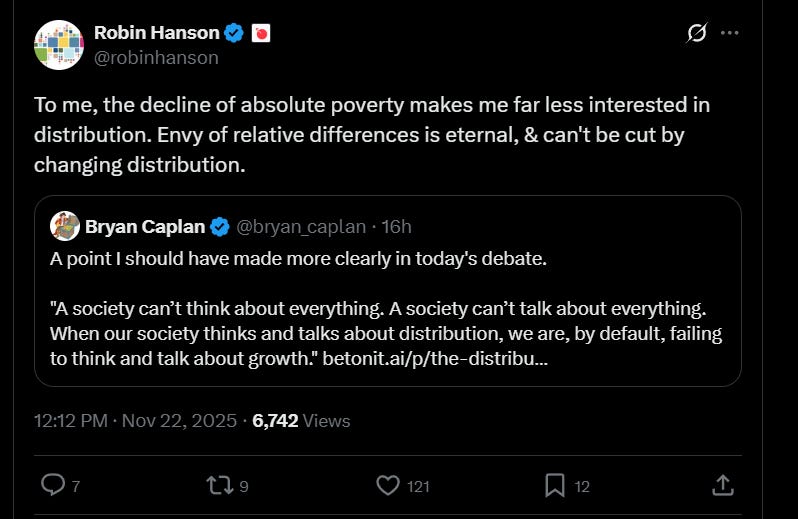The Politics of Envy
Why Relative Resentment Can’t Ground a Coherent Ethics
The debate between Robin Hanson and Bryan Caplan over distribution versus growth exposes a deeper confusion in modern political morality: the conflation of relative position with actual harm. This mistake is everywhere. It animates resentment politics, justifies destructive redistribution, and reframes status anxiety as a public good. Yet the underlying phenomenon is simply envy—a primate comparator loop mistakenly elevated into a moral principle.
The Wrong Target
Absolute poverty has collapsed across the world. The dominant moral metric should therefore shift toward capability expansion: increasing the range of possible futures available to individuals. But political discourse remains fixated on income ratios, wealth percentiles, and status gradients. These metrics measure comparison, not deprivation.
When someone else becomes wealthier, nothing about your agency diminishes. The mere existence of relative differences does not constitute injury. Treating these differences as a moral problem quietly replaces harm with envy, and then smuggles in redistribution as therapy.
The Envy Trap
Envy does not track damage; it tracks comparison. It evolved as a local, competitive heuristic for primate bands, not as a foundation for large-scale political ethics. Indulging envy guarantees policies that reduce total welfare: slowing growth, punishing specialization, and amputating outliers to soothe status discomfort.
A society that validates envy drifts toward destructor logic: tearing down capability to equalize resentment. This is an ethic of subtraction masquerading as fairness.
Agency as the Moral Standard
The Axio framework identifies harm as that which reduces agency via coercion. Relative inequality does not do this. Only absolute deprivation, coercive extraction, or systemic barriers constrain agency. Inequality becomes relevant only when it creates such constraints—not when it activates emotional comparisons.
Mature political thinking recognizes that capability expansion is positive-sum. Envy is zero-sum. Conflating the two leads to policy that sacrifices growth and innovation to achieve a momentary psychological equilibrium.
The Ethical Stance
Envy of relative differences is not something to soothe, to accommodate, or to legislate around. It is something to reject—openly, unapologetically, and on principle.
A moral system centered on agency, growth, and voluntary cooperation treats envy as noise in the signal. The goal is not a world with fewer differences, but a world with more pathways—where individuals can pursue richer, freer, more expansive lives regardless of where they sit in the status hierarchy.
Relative envy should not be indulged. It should be condemned. Not because it is shameful, but because it is irrelevant to harm, corrosive to progress, and antithetical to any coherent ethic of agency.



